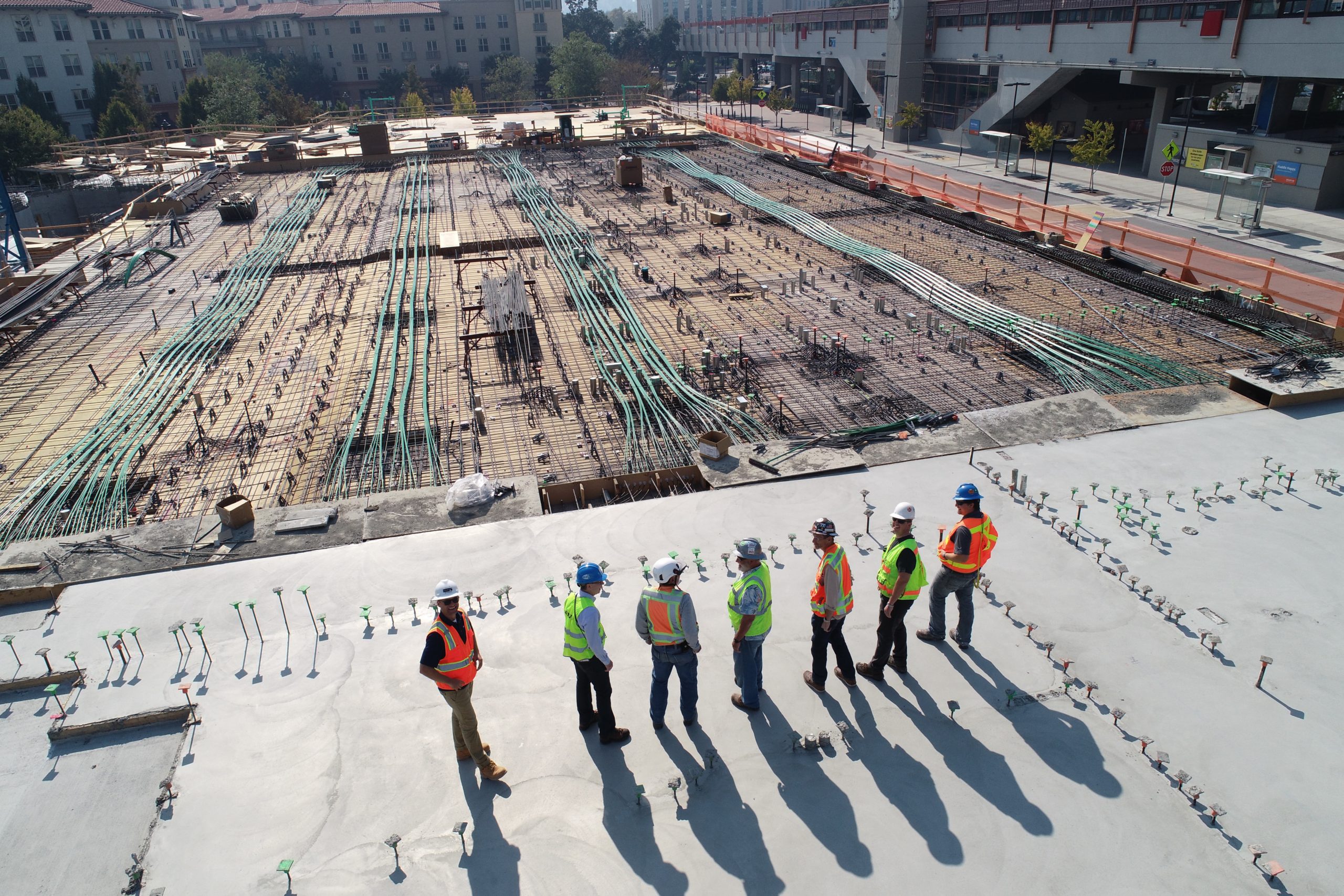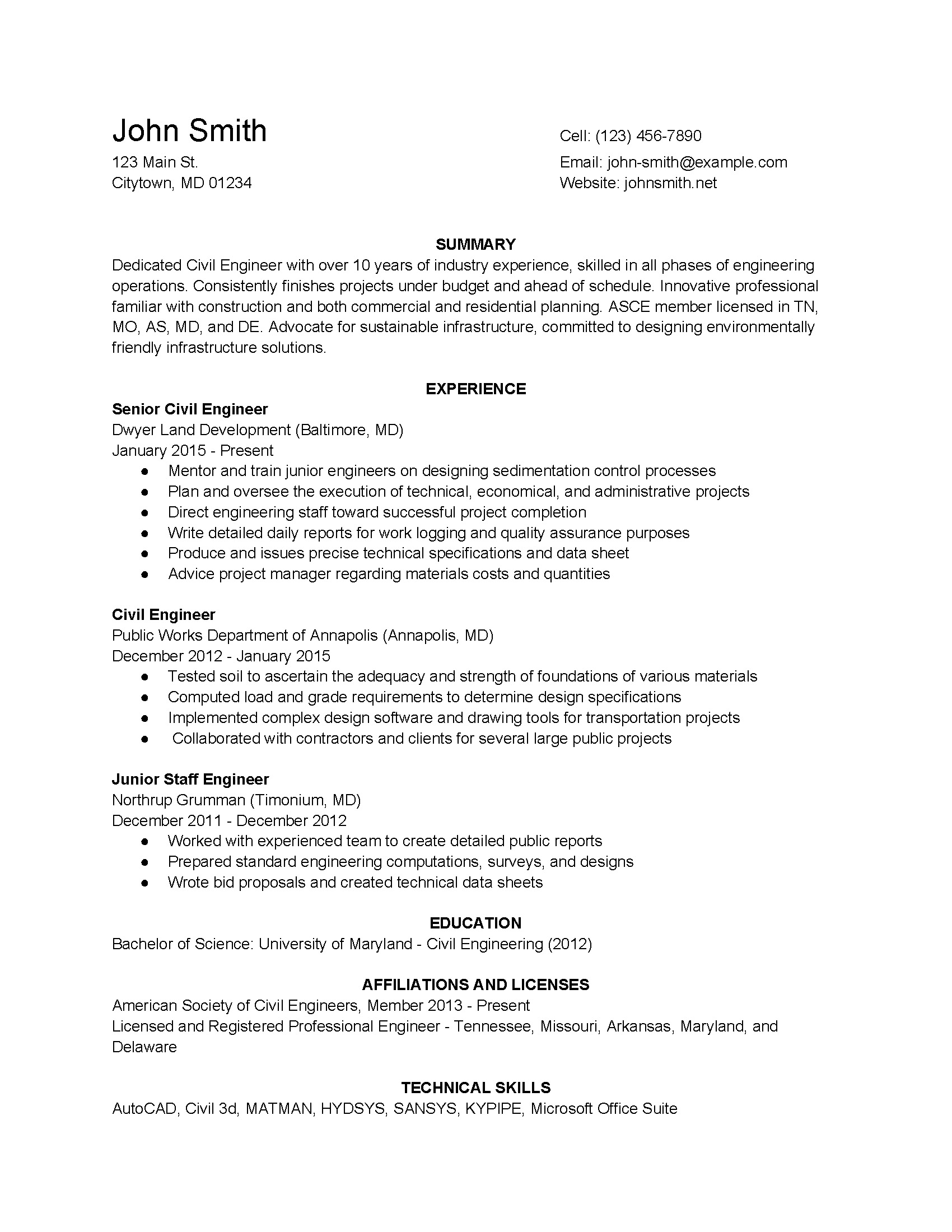Employment opportunities for civil engineers are expected to grow 7% in the next 10 years, and about 24,200 job openings for civil engineers are projected annually. Infrastructure development is expected to increase rapidly over the next few years, meaning that the demand for civil engineers may also rise.

via Unsplash
While employment prospects for civil engineers are looking promising, it’s still essential to create a strong resume to submit with your job applications. In this comprehensive guide, we will cover the components of successful civil engineering resumes, including the resume summary, the resume objective, the job experience section, and contact information.
How to Write a Resume for a Civil Engineer
If you’re applying for a civil engineering position, you’ll need a strong resume to help you stand out from other candidates pursuing the same job. Your resume should begin with your contact information followed by either a resume summary or resume objective, depending on your level of work experience.
After the resume summary or objective, you’ll go into a more detailed description of your work experience that highlights what you can bring to the table. Your resume is an opportunity to make you stand out as a qualified, passionate candidate for each job that you’re applying for. You’ll want to ensure that it’s focused, professional, and relevant.
Write Your Civil Engineer Resume Summary or Objective
One of the first steps you’ll want to take is thinking about your civil engineer resume summary or resume objective. These are two different options for providing an informative paragraph at the beginning of your resume to tell potential employers a little bit more about yourself.
A resume summary should detail your areas of expertise in the construction sector. You can use it to highlight the key projects you’ve designed, built, or supervised. You should also include your educational qualifications, your links to civil engineering societies, and your licenses. It can also be helpful to include a section on your technical and computer skills.
You may opt to write an objective statement rather than a summary. An objective statement is a brief paragraph that describes the value you can add to a company and the needs you can fulfill. It’s catered toward the position you’re applying for, and it summarizes your skills and qualifications, often emphasizing educational experience.
Whether you choose to write a resume summary or a resume objective is up to you. It depends on your level of experience and the length of time that you’ve been working in the civil engineering field.
Is a Resume Summary or a Resume Objective Right for You?
If you’re an applicant with tons of experience, a professional summary may be the right choice for you. Resume summaries tend to be longer and more detailed than objective statements. They’re most helpful for experienced professionals who want to demonstrate skills from a range of past positions.
Resume objectives are better for showing passion for what you’re educated in even if you haven’t built anything yet. It highlights your strengths and what you could bring to the table. Objective statements are usually a bit shorter than summaries because they’re not looking to cover information from a long career.
Civil Engineer Resume Summary Examples
The following is an example of what an effective civil engineering resume summary should look like:
Problem-solving civil engineer with over 8 years of experience completing both private and public infrastructure projects. Registered ASCE member comfortable working independently. Committed to providing high-quality service with a focus on health, safety, and environmental issues. Holds a B.S. in Civil Engineering from Tufts University.
Note how the sentences are written in a typical resume format that omits the subject of the sentence. This example applicant highlighted their years of work experience and types of work they had completed as well as their memberships to civil engineering groups and their relevant degree.
There are also plenty of ways to go wrong with a resume summary. The following is an example of what your civil engineer resume summary should NOT look like:
I am a motivated go-getter and self-starter with an education in the construction and civil engineering industries. I am interested in becoming a member of ASCE. I am seeking an opportunity to advance my career while also balancing my personal life and work life.
This resume summary has a number of issues. First of all, it uses too many pronouns. You want your resume summary to be concise and quick to read. Employers have a lot of resumes on their plates, so yours should be easy to scan. It is also not particularly specific, and it uses buzzwords like “go-getter” and “self-starter.” You want to make sure your summary is not vague and highlights actionable experiences that are relevant to the position.
Civil Engineer Resume Objective Examples
A resume objective should be a short introductory paragraph that tells an employer more about you and your career goals. You want to make sure that you’re mentioning the job title you want as well as 2-3 key skills that you’ll bring to the table. You’ll also explain what you want to achieve in that job.
Remember, resume objectives are best for candidates with little or no work experience. The following is an example of what a successful civil engineer resume objective might look like:
MIT graduate with a B.S. in Civil Engineering and proven project management and operational analysis skills. Holds a certificate in erosion and sedimentation control. Seeking a position as a Civil Engineer at Bridgeport, Inc. in order to support project development with a focus on environmental issues.
What makes this resume objective effective? The applicant was clear and concise, highlighting the education they do have even though they don’t have much work experience. They mentioned the job title they’re applying for and they also noted what they’d be able to bring to the table.
Not all resume objectives are created equal. The following is an example of what an objective statement on a civil engineering resume should NOT look like:
Looking for a civil engineering role where I can apply my skills. I don’t have much experience in the field as of yet, but I’m excited to get started and I want to make a difference.
This objective statement is much too vague. Every candidate is looking to apply their skills and get a civil engineering role, so this won’t make the applicant stand out. While it’s true that some applicants may not have much practical experience, it’s important to highlight the experience or education you do have.
Describe Your Civil Engineering Experience
Once you’ve written the resume summary or objective statement that will sit at the top of your resume, you’ll want to list your experience in a detailed manner. Resumes should include all of the relevant jobs you’ve held in the past 10 years (at least). You can include more than 10 years’ worth of jobs if they’re relevant to the position you’re applying for.
 via Unsplash
via Unsplash
For each position, you’ll want to include the company you worked for, your specific job title, the date range during which you worked at that position, and a brief overview of your job responsibilities and accomplishments while in the role. You can also include any promotions you received while in that position.
What Should You Do if You Have No Experience?
If you don’t have industry experience, you can list volunteer work, internships, or anything else that’s related to civil engineering that you can be proud of. Many individuals who are just starting out in the civil engineering industry or who are changing careers to enter the industry wonder what to include on their resumes.
You can also highlight your educational experience and any research projects or work that you completed while obtaining your degree. Even work that’s not directly related to civil engineering might be applicable if you don’t have a more relevant job to list. That’s because you might have transferable skills (such as working with certain computer programs).
List Your Relevant Licenses
You’ll want to include all of your relevant licenses and where you’re licensed to work on your resume. These licenses should include your EI (Engineer Intern) Certification or your Professional Engineering (PE) License. Other licenses relevant to civil engineering might include an OSHA Safety Certificate or a CCM (Certified Construction Manager) certificate.
Include Your Contact Information
At a minimum, your contact information should include your name, your email address, and a phone number that potential employers can reach you at. This information is essential so that companies can reach out to you to schedule an interview or offer you a position.
Employers review so many resumes that if they can’t figure out how to reach you, they’ll likely just move on to the next one. That’s why contact information is often placed at the very top of a resume, above even the summary or objective statement.

via Unsplash
Taking Contact Information to the Next Level
If you want to take your contact information to the next level and make it even more impressive, you can include a well-put-together website for yourself. Whether you hire a professional to build your website or do it yourself on a site builder like Wix or Squarespace, it’s crucial that this website is professional, well-made, and kept up-to-date.
A professional website can be a great place to give employers the opportunity to learn even more about you, your background, and your skill set. You can include a digital resume on your website, and you can also include a portfolio that discusses your previous projects and shows examples of your work.
It’s also helpful to have a LinkedIn profile. These days, most recruiters use LinkedIn to find candidates. You can link your resume to your LinkedIn profile, and you can also include a LinkedIn profile link on your resume. That way, your employer can explore more features of your professional history.
Civil Engineer Sample Resume
Now that you know more about what a typical civil engineer’s resume should include, take a look at the following sample resume to see an example of how it could all come together. This resume is for an imaginary applicant with 10 years of industry experience, during which they have worked in three different civil engineering roles.
Because the applicant has more experience, their resume includes a resume summary rather than an objective statement. They begins with their contact information, followed by a summary, and then a more detailed dive into their work experience. After that section, they also include information about their licenses and technical qualifications:
 Now that you know how to build a civil engineering resume to land your next job, all that’s left to do is go out and make it! If you utilize our tricks of the trade, you’ll be ahead of your fellow job-seekers in landing your next job. Happy job hunting!
Now that you know how to build a civil engineering resume to land your next job, all that’s left to do is go out and make it! If you utilize our tricks of the trade, you’ll be ahead of your fellow job-seekers in landing your next job. Happy job hunting!





